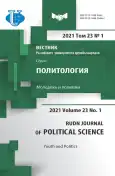How Russian Youth Consume Information: Case Study of the Political Science Students of the Financial University
- Authors: Volodenkov S.V.1, Belokonev S.Y.2, Suslova A.A.2
-
Affiliations:
- Moscow State University Lomonosov
- Financial University under the Government of the Russian Federation
- Issue: Vol 23, No 1 (2021): Youth and Politics
- Pages: 31-46
- Section: YOUTH IN POLITICS
- URL: https://journal-vniispk.ru/2313-1438/article/view/322129
- DOI: https://doi.org/10.22363/2313-1438-2021-23-1-31-46
- ID: 322129
Cite item
Full Text
Abstract
This article is devoted to analyzing the results of a study conducted by the Educational and Scientific Laboratory of Internet Projects and Studies of the Department of Political Science and Mass Communications of the Financial University among university students. The work aimed to identify the characteristics and structure of youth information consumption in the digital space during the COVID-19 pandemic. The authors analyzed the intensity and frequency of use of various types of information sources, identified the dominant sources of socio-political information, determining the level of trust in them, identified factors that affect the perception of message content. The article also analyzes the attitude of the respondents to the issue of Internet regulation by the state, defines and structures the subjective assessments of the “opposition” of the Internet space concerning existing government institutions. The paper concludes that the structure of the information consumption of the respondents shows a steady shift in the emphasis on information and communication activity of young people to digital platforms, sources, and channels. The youth audience spends a significant part of their active time in the digital space, which in its volume is comparable or even in many cases exceeds the amount of time spent in the traditional offline space. The consequence of this is the formation of “digital information overload”, stimulating the development and consolidation of the effect of clip consciousness. In general, based on the results of the work, the authors conclude that there is a stable structure of youth information consumption that has pronounced differences from the traditional structure of information consumption of older generations. Moreover, the processes of information consumption in the digital space are mostly irrational, and they are mainly based on “digital habits” that form the models of digital information consumption of modern students.
About the authors
Sergey Vladimirovich Volodenkov
Moscow State University Lomonosov
Author for correspondence.
Email: s.v.cyber@gmail.com
Doctor of Political Science, Professor, Department of Public Policy, Faculty of Political Science
Moscow, Russian FederationSergey Yuryevich Belokonev
Financial University under the Government of the Russian Federation
Email: syubelokonev@fa.ru
PhD in Political Science, Associate Professor, Scientific Director of the Department of Political Science and Mass Communications
Moscow, Russian FederationAnastasia Andreevna Suslova
Financial University under the Government of the Russian Federation
Email: asiasuslova@gmail.com
Head of the Laboratory for Internet Projects and Research, Department of Political Science and Mass Communications
Moscow, Russian FederationReferences
- Agostino, D., Arnaboldi, M., & Lema, M. D. (2020). New development: COVID-19 as an accelerator of digital transformation in public service delivery. Public Money & Management. doi: 10.1080/09540962.2020.1764206
- Aysina, R. M., & Nesterova, A. A. (2019). Cyber socialization of youth in the information and communication space of the modern world: Effects and risks. Social Psychology and Society, 10(4), 42–57. doi: 10.17759/sps.2019100404. (In Russian).
- Dunas, D., & Vartanov, S. (2020). Emerging digital media culture in Russia: Modelling the media consumption of generation Z. Journal of Multicultural Discourses, 15(2), 186–203. doi: 10.1080/17447143.2020.1751648
- Dunas, D., Salikhova, E., Tolokonnikova, A., & Filatkina, G. (2020). Media consumption by studying youth: Results of a survey in Moscow, Nizhny Novgorod and Rostov-on-Don. Tomsk State University Journal of Philology, 67, 278–302. doi: 10.17223/19986645/67/15. (In Russian).
- Dunas, D.V. et al. (2020). Motivation factors in media consumption of “digital youth” in Russia: Results of a pilot study. Vestnik Moskovskogo Universiteta. Seriya 10. Zhurnalistika, 2, 3–27. doi: 10.30547/vestnik.journ.2.2020.327. (In Russian).
- George, B., & Paul, J. (2020). Digital Transformation in Business and Society. Theory and Cases. Springer International Publishing, Palgrave Macmillan Publ. doi: 10.1007/978-3-030-08277-2
- Hussain, W. (2020). Role of social media in COVID-19 pandemic. The International Journal of Frontier Sciences, 4(2), 59-60. doi: 10.37978/tijfs.v4i2.144
- Iivari, N., Sharma, S., & Ventä-Olkkonen, L. (2020). Digital transformation of everyday life – how COVID-19 pandemic transformed the basic education of the young generation and why information management research should care? International Journal of Information Management, 55. doi: 10.1016/j.ijinfomgt.2020.102183
- Kümpel, A. S., Karnowski, V., & Keyling, T. (2015). News sharing in social media: A review of current research on news sharing users, content, and networks. Social Media + Society, 1(2). doi: 10.1177/2056305115610141
- Lovink, G. (2019). Critical Theory of the Internet. Мoscow: Ad Marginem Press, The Museum of Contemporary art “Garage”. (In Russian).
- Pérez-Escoda, A., Jiménez-Narros, C., Perlado-Lamo-de-Espinosa, M., & Pedrero-Esteban, L. M. (2020). Social networks’ engagement during the COVID-19 pandemic in Spain: Health media vs. healthcare professionals. International Journal of Environmental Research and Public Health, 17(14), 5261. DOI: /10.3390/ijerph17145261
- Rachipa, A. V., Brusentseva, D. M., & Fatkulina, L. A. (2019). Internet technologies as a means of managing the media socialization process of young people. State and Municipal Management. Scholar Notes, 2, 230–234. doi: 10.22394/2079-1690-2019-1-2-230-234. (In Russian).
- Srnicek, N. (2019). Platform Capitalism. Мoscow: HSE Publisers. doi: 10.17323/978-5-7598-1786-4. (In Russian).
- Volodenkov, S. V., & Pastarmadzhieva, D. D. (2020). Digital society in the context of the COVID-19 pandemic: First results and prospects (comparative analysis of the experience of Russia and Bulgaria). Journal of Political Research, 2, 80–89. doi: 10.12737/2587-6295-2020-80-89
- Vyugina, D. (2019). Generation Z in Russia: The digital divide of the Generation Putin. In C. Scholz & A. Rennig (Eds.), Generations Z in Europe (The Changing Context of Managing People). Bingley: Emerald Publishing Limited.
Supplementary files









